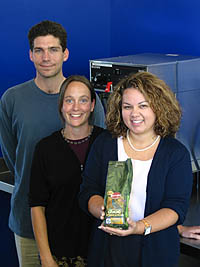|
September 22, 2003
Java for justice
Fair-trade coffee now offered in dining halls,
from campus-operated coffee carts
By Jennifer McNulty
Wake up and smell the fair-trade coffee in UCSC dining halls this fall.
 |
| Fair-trade gourmet coffee will
be served in campus dining halls thanks to, left to right, student
organizers Tony LoPresti and Suzanne Langridge, who worked with
Alma Sifuentes, director of residential and dining services. Photo:
Jennifer McNulty |
That’s the message from students and staff who have worked together
to introduce flavorful, high-quality, ecologically friendly coffee on
campus.
Certified fair-trade coffee guarantees farmers a price that reflects
the true costs of labor, land, and production of coffee grown using
eco-friendly techniques.
Although this coffee costs more than conventional beans, certification
eliminates the “middle man” and ensures that more profit goes
into the pockets of farmers.
“The students talked with us and began educating me about how
the coffee industry works,” said Alma Sifuentes, director of residential
and dining services at UCSC, who made the decision to introduce fair-trade
coffee on campus after hearing the concerns of students.
“Students in our own Agroecology Program are doing research about
coffee, and they described where the money goes and how it is distributed,
and how the campus could really aid the environment and social justice
by making this change. It’s very exciting.”
Serving fair-trade coffee in campus dining halls and at campus-operated
coffee carts is also a good business decision that builds on UCSC’s
commitment to sustainability, said Sifuentes.
“I’m looking to build alliances with our internal departments
and the mission of the university,” said Sifuentes, a UCSC alum
who graduated in 1986 with a degree in economics. “If we can connect
undergraduate, graduate, and faculty research, that’s putting theory
into practice. It makes sense for us to utilize the information to be
better consumers and to help our Earth. UC Santa Cruz has always been
about social justice.”
The goal of the fair-trade coffee movement is to provide economic stability
for small-scale farmers and to encourage sustainable growing techniques
that replenish the Earth. The international movement has surged as the
price of coffee over the last decade has dropped below the costs of
production, plunging small-scale farmers into poverty and forcing many
to default on loans and lose their land. Global free trade is a major
contributor to the coffee glut that has driven prices down and unemployment
up.
At UCSC, several faculty members, including Stephen Gliessman of environmental
studies, are researching the economic, social, and political aspects
of coffee production. Students are also involved, including graduate
student Chris Bacon, who is investigating the impacts of the fair-trade
movement on farmers in Nicaragua with the guidance of Jonathan Fox,
professor of Latin American and Latino studies.
Graduate student Suzanne Langridge and Tony LoPresti, who graduated
in June with a bachelor’s in Latin American and Latino studies,
spearheaded the student-led effort to educate the campus community about
fair-trade coffee. As members of Comercio Justo (Spanish for “fair
trade”), Langridge and LoPresti organized workshops, photo exhibits,
and presentations about globalization and coffee, and the impacts of
the coffee crisis on peasant farmers.
As consumers, they explained, students can have a direct role in improving
the lives of farmers by buying fair-trade coffee. “Students learn
so much about the negative impacts of globalization, and this gives
them a way to take action,” said LoPresti. “It’s about
taking a small step toward equity on a global scale.”
“The fair-trade movement is about reworking producer-consumer
relationships,” said Langridge, noting other fair-trade products,
including bananas, chocolate, and textiles. “Coffee is the ideal
commodity for students on campus to support, because they drink so much
of it.”
The students first targeted the coffee carts on campus, securing an
agreement last winter that only fair-trade coffee would be served by
spring. As part of that effort, they submitted petitions signed by 2,500
members of the campus community, requesting that fair-trade coffee be
served in the dining halls, as well.
“We’re grateful to have Alma, because she is listening to
students and making every effort to align the university with the students,”
said LoPresti.
An added benefit of fair-trade is that it tastes better, too, said
Sifuentes, who attended a coffee tasting this summer with students doing
research on topics related to coffee production.
For now, fair-trade and conventional coffee will be available in all
five campus dining halls. “We’re trying to keep costs down,
so it helps to have the old Maxwell House standing by,” she said.
“Depending on student tastes and preferences, which change during
the year, if managers see nobody is drinking the Maxwell House, they’ll
probably pull it. Our goal is to eventually go all fair-trade.”
Sifuentes is committed to responding to student interests without increasing
what students pay for meals. “Maxwell House is a lot cheaper, but
if fair-trade is popular, we’ll make adjustments in other areas
to manage the additional cost,” she said.
The change comes as the campus is moving toward self-operation of the
dining halls, which is scheduled to be completed by June 20, 2004. “We
just hired nearly 200 people, and there are lots of labor issues to
work out,” said Sifuentes. “It’s the same with coffee
farmers in Central America. They need to earn a living wage, too.”
UCSC is one of more than 200 college and university campuses around
the United States that are conducting fair-trade coffee campaigns. Among
the campuses that now serve fair-trade coffee are UC Berkeley, UCLA,
Yale, Harvard, Wesleyan, Georgetown, and Boston College. As the West
Coast representative for United Students for Fair Trade (USFT), Comercio
Justo will host the group’s first-ever national conference with
other student organizers in Santa Cruz this winter.
“We want to expand to other UC campuses and inspire activists
working on global justice to initiate fair-trade campaigns on their
campuses,” said LoPresti. “We want to deepen fair-trade and
go beyond coffee.”
Return to Front Page
|